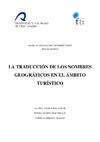Identificador persistente para citar o vincular este elemento:
https://accedacris.ulpgc.es/jspui/handle/10553/70254
| Campo DC | Valor | idioma |
|---|---|---|
| dc.contributor.advisor | Díaz Peralta, Marina | es |
| dc.contributor.author | Zabala Okosi, Pilar | es |
| dc.date.accessioned | 2020-02-12T17:34:37Z | - |
| dc.date.available | 2020-02-12T17:34:37Z | - |
| dc.date.issued | 2019 | - |
| dc.identifier.uri | https://accedacris.ulpgc.es/handle/10553/70254 | - |
| dc.description.abstract | En este Trabajo de Fin de Grado, podremos observar la trascendencia de la traducción de topónimos o nombres geográficos en el ámbito turístico, así como los posibles problemas de comunicación que esta conlleva, con el fin de demostrar que el método de extranjerización en este tipo de sustantivo es el más adecuado a la hora de traducir. Antes de alcanzar esta conclusión, nos introduciremos en los distintos conceptos que nos permitirán crear un marco teórico que acogerá desde el concepto de turismo hasta la clasificación de los problemas de traducción. Asimismo, veremos las razones por las que el uso del método de la extranjerización es cada vez mayor. Realizaremos un análisis contrastivo de distintos textos turísticos de los que estudiaremos una serie de topónimos seleccionados, tanto de ciudades españolas como del resto del mundo, guiándonos por los criterios de la Real Academia Española y la Fundéu en el caso de los topónimos que son traducidos al español. Es aquí donde nos centraremos en el origen de los nombres geográficos y sus traducciones en los idiomas propuestos (español, inglés, alemán, francés e italiano). De esta forma, podremos comprobar que el español, junto con el francés y el italiano, es uno de los idiomas que más domestica los nombres geográficos en este estudio. En cambio, la lengua alemana y la inglesa veremos que preferirán la extranjerización. | en_US |
| dc.description.abstract | We will be able to observe the importance of the translation of toponyms or geographical names in the tourist field, as well as the possible communication problems that this entails, with the aim of demonstrating that the method of foreignization in this type of noun is the most appropriate when translating. Before reaching this conclusion, we will introduce ourselves into the different concepts that will allow us to create a theoretical framework that will include from the concept of tourism to the classification of translation problems. Likewise, we will see the reasons why the use of the method of foreignization is increasing. We will perform a contrasting analysis of different tourist texts from which we will study a series of selected toponyms, both from Spanish cities and from the rest of the world, guiding us by the criteria of the Real Academia Española and the Fundéu in the case of toponyms that are translated into Spanish. It is here that we will focus on the origin of geographical names and their translations into the proposed languages (Spanish, English, German, French and Italian). In this way, we will be able to verify that Spanish, together with French and Italian, is one of the languages that adapts geographical names the most. On the other hand, German and English languages prefer foreignization. | en_US |
| dc.language | spa | en_US |
| dc.subject | 570112 Traducción | en_US |
| dc.subject.other | Topónimo | es |
| dc.subject.other | Turismo | es |
| dc.subject.other | Domesticación | es |
| dc.subject.other | Extranjerización | es |
| dc.subject.other | Venuti | es |
| dc.subject.other | Nombres propios | es |
| dc.subject.other | Idiomas | es |
| dc.subject.other | Toponym | es |
| dc.subject.other | Tourism | es |
| dc.subject.other | Domestication | es |
| dc.subject.other | Foreignization | es |
| dc.subject.other | Proper names | es |
| dc.subject.other | Languages | es |
| dc.title | La traducción de los nombres geográficos en el ámbito turístico | es |
| dc.type | info:eu-repo/semantics/bachelorThesis | es |
| dc.type | BachelorThesis | es |
| dc.contributor.facultad | Facultad de Traducción e Interpretación | en_US |
| dc.investigacion | Artes y Humanidades | en_US |
| dc.type2 | Trabajo final de grado | en_US |
| dc.identifier.matricula | TFT-56202 | es |
| dc.identifier.ulpgc | Sí | es |
| dc.contributor.titulacion | Grado en Traducción e Interpretación: Inglés-Alemán | es |
| item.grantfulltext | open | - |
| item.fulltext | Con texto completo | - |
| crisitem.advisor.dept | GIR IATEXT: Cognición, Lingüística, Texto y Procesamiento de la Información | - |
| crisitem.advisor.dept | IU de Análisis y Aplicaciones Textuales | - |
| crisitem.advisor.dept | Departamento de Filología Hispánica, Clásica y de Estudios Árabes y Orientales | - |
| Colección: | Trabajo final de grado | |
Visitas
326
actualizado el 13-ene-2024
Descargas
2.887
actualizado el 13-ene-2024
Google ScholarTM
Verifica
Comparte
Exporta metadatos
Los elementos en ULPGC accedaCRIS están protegidos por derechos de autor con todos los derechos reservados, a menos que se indique lo contrario.
